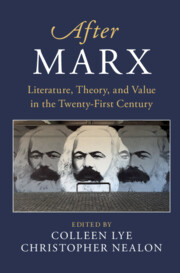Book contents
- After Marx
- After Series
- After Marx
- Copyright page
- Contents
- Contributors
- Acknowledgments
- Introduction
- Chapter 1 Black Marxism and the Antinomies of Racial Capitalism
- Chapter 2 Eco-Criticism and Primitive Accumulation in Indigenous Studies
- Chapter 3 Screening Insurrection: Marx, Cinema, Revolution
- Chapter 4 Marxist Ecology and Shakespeare
- Chapter 5 There Is No “More Commodification”: Periodizing Capitalist Transformation
- Chapter 6 The Irreconcilable: Marx after Literature
- Chapter 7 The Rise and Fall of the English-Language Literary Novel since World War II
- Chapter 8 Literature and the State
- Chapter 9 Post-Soviet Aesthetics
- Chapter 10 Lu Xun’s Literary Revolution in Chinese Marxism
- Chapter 11 Latin American Literature and Dependency Theory Today
- Chapter 12 Industry Culture: Labor and Technology in Marxist Critical Theory
- Chapter 13 In Service to Capital: Theater and Marxist Cultural Theory
- Chapter 14 Hidden Abodes and Inner Bonds: Literary Study and Marxist-Feminism
- Chapter 15 Poetry and Revolution
- Index
- References
Chapter 14 - Hidden Abodes and Inner Bonds: Literary Study and Marxist-Feminism
Published online by Cambridge University Press: 12 March 2022
- After Marx
- After Series
- After Marx
- Copyright page
- Contents
- Contributors
- Acknowledgments
- Introduction
- Chapter 1 Black Marxism and the Antinomies of Racial Capitalism
- Chapter 2 Eco-Criticism and Primitive Accumulation in Indigenous Studies
- Chapter 3 Screening Insurrection: Marx, Cinema, Revolution
- Chapter 4 Marxist Ecology and Shakespeare
- Chapter 5 There Is No “More Commodification”: Periodizing Capitalist Transformation
- Chapter 6 The Irreconcilable: Marx after Literature
- Chapter 7 The Rise and Fall of the English-Language Literary Novel since World War II
- Chapter 8 Literature and the State
- Chapter 9 Post-Soviet Aesthetics
- Chapter 10 Lu Xun’s Literary Revolution in Chinese Marxism
- Chapter 11 Latin American Literature and Dependency Theory Today
- Chapter 12 Industry Culture: Labor and Technology in Marxist Critical Theory
- Chapter 13 In Service to Capital: Theater and Marxist Cultural Theory
- Chapter 14 Hidden Abodes and Inner Bonds: Literary Study and Marxist-Feminism
- Chapter 15 Poetry and Revolution
- Index
- References
Summary
This chapter argues that Marxist-feminist methods informed by new readings of Marx that first emerged in Germany in the 1960s can provide capacious and flexible critical tools for feminist analysis. Drawing in particular on the concept of real abstraction, I demonstrate an approach to Marxist-feminist literary study that avoids structuralist and economistic understandings of cultural production, as well as the simplistic notions of false consciousness and ideology critique that inflect much twentieth-century Marxist literary criticism. Rather, Marx’s critique of value as a social form that operates “behind our backs,” as a set of impersonal compulsions that push forward independent of thought, can help us to better understand the dialectics of aesthetic experience – exemplified here in my reading of feminized poetry – as an important mode of sense-perception attuned to (or even able to “theorize”) the dynamic and contradictory reproduction of gender and its mediation by capital.
- Type
- Chapter
- Information
- After MarxLiterature, Theory, and Value in the Twenty-First Century, pp. 225 - 239Publisher: Cambridge University PressPrint publication year: 2022
References
- 7
- Cited by

